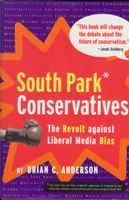In the election year of 2004, the new media turned up the heat. It put CBS right at the center of an even more significant controversy: Rathergate, the liberal media’s götterdämmerung. On September 8, CBS News anchor Dan Rather famously took to the air on 60 Minutes II trumpeting “newly obtained” Texas Air National Guard documents from the early 1970s, which purported to show that President George W. Bush had neglected his guard duties three decades ago. In a close election, the revelations hurt W.’s reelection hopes—or would have, had they been true.(South Park Conservatives
Rather’s “scoop” began to unravel almost instantly, thanks to intrepid bloggers. CBS posted the documents on its website the night of the 60 Minutes II broadcast. “Buckhead,” a conservative lawyer writing in to the conservative FreeRepublic.com site, called the memos forgeries a few hours later, arguing that no machine from the early 1970s could have produced such fonts and spacing. From there, political blogs Power Line (named Time’s first annual blog of the year) and Little Green Footballs took over. On the morning of September 9, Power Line’s Scott Johnson posted a few paragraphs headed “The 61st Minute,” agreeing with Buckhead that the story seemed fishy, and trudged off to his day job as a lawyer. When he got to the office, dozens of reader e-mails were waiting for him, offering evidence as to why the guard documents had to be fake. By late morning, Power Line “had an arsenal of arguments attacking the memos—typographical, logical, procedural, historical,” as Time put it.
Later that afternoon, Little Green Footballs host Charles Johnson, a webpage designer by trade, used Microsoft Word default settings to create a seemingly exact replica of one of the memos. At this point, any one following the blogosphere sleuthing knew that CBS’s story was bogus. These sites had readerships of thousands. But when Drudge linked to Power Line—”60 Minutes Documents on Bush Might Be Fake” blared the headline—millions learned of the rising scandal.
CBS dug in, calling the bloggers “partisan political” operatives. Former CBS News exec and now CNN news head Jonathan Klein, appearing on FOX News, sniffed that the typical blogger was “a guy sitting in his living room in his pajamas writing what he thinks,” nothing like CBS’s professional news operation, with its “multiple layers of checks and balances.” (Klein’s comment inspired Jim Geraghty of NRO’s campaign blog the KerrySpot to dub the agents of the blogos phere the “pajamahadeen.”) NBC anchor Tom Brokaw accused bloggers of waging a kind of "political jihad against Dan Rather and CBS News."
But CBS couldn’t suppress the truth—not in 2004. A few years ago, noted InstaPundit’s law prof host Glenn Reynolds, “CBS would have flashed the documents on TV for a few seconds and no one would have seen them again. Even the people with doubts would have assumed that CBS had done its legwork.” Now the blogosphere—NRO, HughHewitt.com, BeldarBlog, RealClearPolitics, RatherBiased.com, and other sites that had picked up the story—kept fact-checking, reporting the analyses of experts on typography, National Guard practices, and other aspects of the controversy. Talk radio started to cover Rathergate “like a blanket,” says veteran radio host Mike Siegel. FOX News did too.
At last, the pressure grew so great that mainstream outlets ABC News and the Washington Post began reporting the story. The New York Times held out a bit longer—it so wanted to believe that the story would hurt Bush that it actually ran a headline proclaiming the memos “Fake but Accurate.” But even the Times, which had been embarrassed the year before by the blogosphere’s role in uncovering reporter Jayson Blair’s in-print fabrications, started to snoop around.
What emerged under this new-media and old-media spotlight wasn’t pretty. CBS, it turned out, had received the memos from notorious Texan Bush-hater Bill Burkett. The network’s own document experts refused to authenticate the memos, and Rather’s crew had ignored rel evant sources—and anything else that countered the story’s anti-Bush thrust. Worse still, CBS producer Mary Mapes had urged a campaign aide to Democratic presidential hopeful John Kerry to contact Burkett about the story—the old media conspiring with the Democratic Party to bring down a Republican president. It was a paradigmatic case of liberal media bias—mendacity, even.
By Brian C. Anderson :xi-xii)

No comments:
Post a Comment